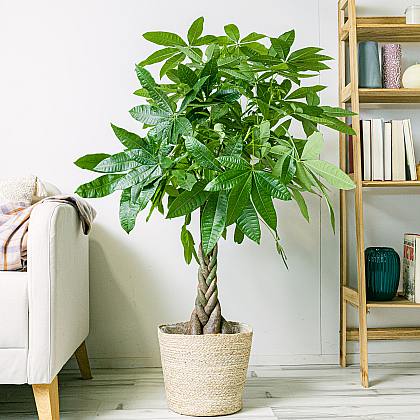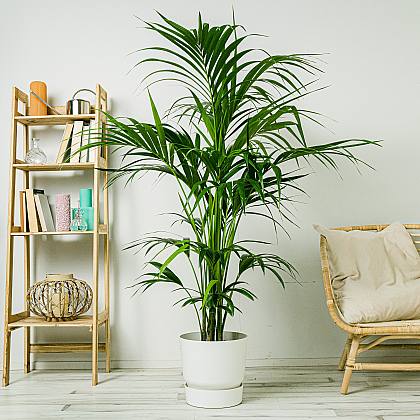Sleep better at night thanks to these wonderful houseplants that help you relax and fall asleep
Do you have a hard time falling asleep at night? Do you suffer from insomnia or do you wake up frequently during the night? Don't worry, there is a solution
Do you have a hard time falling asleep at night? Do you suffer from insomnia or do you wake up frequently during the night? Don't worry, there is a solution. Houseplants can be your allies for a restful and peaceful sleep. In addition to being a beautiful decoration for your home, certain plants have relaxing and calming properties that help improve the quality of sleep. In this article, we'll introduce you to some of the best houseplants for better sleep, including lavender, jasmine, valerian, peace lily, peppermint, and passion flower. Find out how these plants can improve your sleep and how you can incorporate them into your home for a full night's sleep.
Houseplants: your ally for a restful sleep
Houseplants can become your ally for a restful sleep. Not only are these plants decoratively attractive, but they can also improve the quality of your night's rest. Some plants have relaxing and calming properties that help create a peaceful and sleep-friendly environment. In addition, many of them also have the ability to purify the air, which contributes to a healthier environment in your home. Some of the recommended houseplants to improve sleep include lavender, jasmine, valerian, peace lily, peppermint, and passion flower. These plants emit soft, pleasant fragrances that promote relaxation and reduce stress levels, helping you disconnect from the daily hustle and bustle and prepare you for a deep rest. Additionally, some of these plants have natural sedative properties that can help fight insomnia and promote more restful sleep. Placing these plants in your bedroom or near your bed can create a calming and inviting environment that helps you fall asleep faster and enjoy a restful night's sleep.
Lavender: The Soothing Scent That Plunges You Into A Deep Sleep
Lavender is one of the most popular houseplants for improving sleep quality. Its soothing scent helps reduce stress and anxiety, which can be especially helpful for people who have difficulty falling asleep. In addition, lavender has also been shown to lower blood pressure and heart rate, which can contribute to deeper, more restful sleep.
To take full advantage of the benefits of lavender, it is recommended to place a plant in the bedroom or use lavender essential oil in a diffuser. The soft, floral scent of lavender helps to calm the mind and prepare the body for rest. In addition, it can also help relieve headaches and migraines, which can be especially helpful for those experiencing chronic pain.
However, it is important to note that some people may be sensitive to the scent of lavender and experience allergic reactions or skin irritation. Therefore, it is advisable to test the plant or essential oil in small amounts before using it regularly.
In conclusion, lavender is an excellent choice for those looking to improve their sleep quality naturally. Its soothing aroma and calming properties can help reduce stress and anxiety, promoting deep, restful sleep.
The Powerful Soothing Effect of Jasmine on Your Night's Rest
The Powerful Soothing Effect of Jasmine on Your Night's Rest
Jasmine is a houseplant that not only beautifies our spaces, but also has a powerful calming effect on our night's rest. Its delicate floral scent is known for its relaxing properties and ability to induce deep, restful sleep.
The scent of jasmine has the ability to reduce stress and anxiety levels, creating a calm and conducive environment for falling asleep. In addition, the smell of jasmine has been shown to stimulate the release of serotonin, a hormone that promotes feelings of well-being and happiness.
There are even scientific studies that support the benefits of jasmine in getting a good night's rest. A 2010 study found that the scent of jasmine improves sleep quality, increases the amount of time we spend in the deep sleep phase, and reduces agitation during the night.
A simple way to enjoy the benefits of jasmine is to place a bouquet of fresh flowers in your room or use jasmine essential oil in a diffuser. You can also opt for jasmine-scented personal care products, such as lotions or scented candles.
In conclusion, jasmine is a houseplant that not only beautifies our spaces, but also has a powerful calming effect on our night's rest. Its soothing aroma helps reduce stress and anxiety, promoting deep, restful sleep. Take advantage of the benefits of jasmine to improve your quality of sleep and wake up refreshed every morning.
Valerian: A Natural Plant to Combat Insomnia
Valerian is a medicinal plant that has been used for centuries to combat insomnia and other sleep disorders. This plant contains active compounds that act as natural sedatives, making it an excellent ally for those who suffer from trouble falling asleep. Valerian's relaxing effects are due to its ability to increase levels of gamma-aminobutyric acid (GABA) in the brain, a neurotransmitter that helps reduce neural activity and promotes feelings of calm and relaxation.
Valerian can be consumed in the form of tea or as a dietary supplement in capsules or tablets. Although generally considered safe, some people may experience side effects such as dizziness, headache, and upset stomach. For this reason, it is important to speak with a healthcare professional before starting valerian, especially if you are taking any prescription medications or have any medical conditions.
In summary, valerian is a natural plant that can help fight insomnia and other sleep disorders thanks to its sedative properties. If used correctly and under the supervision of a healthcare professional, valerian can be a safe and effective alternative to prescription insomnia medications.
The Peace Lily: Purifies the Air and Promotes Peaceful Sleep
The peace lily is a houseplant that not only adds beauty to your home, but also has benefits to promote peaceful sleep. In addition to being a decorative plant, the peace lily is known for its air-purifying properties. This plant is able to filter out toxins such as formaldehyde and carbon monoxide, thus improving the air quality in your bedroom. By having a cleaner, healthier environment, you're more likely to be able to breathe better at night, contributing to more restful sleep.
In addition to its ability to purify the air, peace lily also emits moisture, which can help combat common sleep problems such as dry airways and nasal congestion. By maintaining an optimal level of humidity in the environment, this plant can facilitate easier and deeper breathing, which promotes a calmer and more restful sleep.
Another beneficial aspect of the peace lily is its ability to reduce stress and anxiety levels. Its vibrant green leaves have a relaxing effect on the mind and body, which can help calm thoughts and worries before bed. By creating a calm and serene environment in your bedroom, peace lily can help you fall asleep more quickly and enjoy a deep night's rest.
In short, having a peace lily in your bedroom not only adds aesthetic beauty, but also purifies the air and promotes peaceful sleep. Its ability to filter toxins and maintain an adequate level of humidity in the environment improves the quality of the air you breathe at night. In addition, its relaxing effect helps to reduce stress and anxiety, creating an environment conducive to full rest.
Peppermint: freshness and calm for a carefree night
Peppermint is a very popular plant that is used both in cooking and in natural medicine. In addition, this herb has relaxing properties that make it an excellent ally for falling asleep and improving the quality of sleep. The scent of peppermint has a cooling and calming effect that helps reduce anxiety and stress accumulated during the day. In this way, when inhaling its fragrance, a feeling of well-being is produced that favors a night's rest.
Peppermint also has an analgesic effect that can relieve muscle aches and headaches, helping to reduce discomfort that can prevent restful sleep. In addition, this plant is also known for its digestive properties, which can be beneficial for those who suffer from stomach or digestive problems that affect their sleep.
To reap the benefits of peppermint, it is recommended to place a plant in the bedroom or use peppermint essential oil in a diffuser. Peppermint infusions can also be prepared to drink before sleeping. However, it's important to note that while peppermint can be beneficial for many people, some may experience side effects such as heartburn or skin irritation. Therefore, it is always advisable to consult with a specialist before using any type of natural remedy. In conclusion, if you're looking for a natural remedy to improve your sleep, don't hesitate to try the benefits of peppermint.
The soothing potential of passion flower in your nights
Passion flower, also known as Passiflora, is a houseplant that has relaxing potential on your nights. This plant is known for its sedative properties and its ability to promote peaceful sleep. Passion flower contains natural compounds that act on the nervous system, helping to reduce stress and anxiety, two factors that can interfere with restful sleep. Inhaling its mild and sweet aroma stimulates the release of endorphins, resulting in a sense of calm and well-being. In addition, this plant can also help regulate sleep patterns, allowing for deeper, more revitalizing sleep. To enjoy the relaxing benefits of passion flower in your evenings, you can place it near your bed or in your bedroom. In addition, you can also choose to prepare an infusion with its leaves and dried flowers to drink before bed. However, it's important to note that everyone is different and may react differently to plants. If you experience any adverse reactions or have any concerns, it is advisable to consult a healthcare professional before using it as a treatment for insomnia. In conclusion, passion flower is a houseplant with relaxing potential that can help you fall asleep and enjoy a peaceful night.
Houseplants can be a great ally in achieving a restful sleep and improving the air quality in your home. From lavender to mint, each plant has unique properties that can help you relax and fall asleep. In addition, using natural plants instead of insomnia medications can have long-term benefits on your health. However, it's important to remember that everyone is different and what works for some may not work for others. If you have chronic sleep problems, it's best to consult with a healthcare professional before resorting to natural remedies. All in all, experimenting with houseplants can be an interesting and effective way to improve your night's rest and promote a healthier lifestyle


